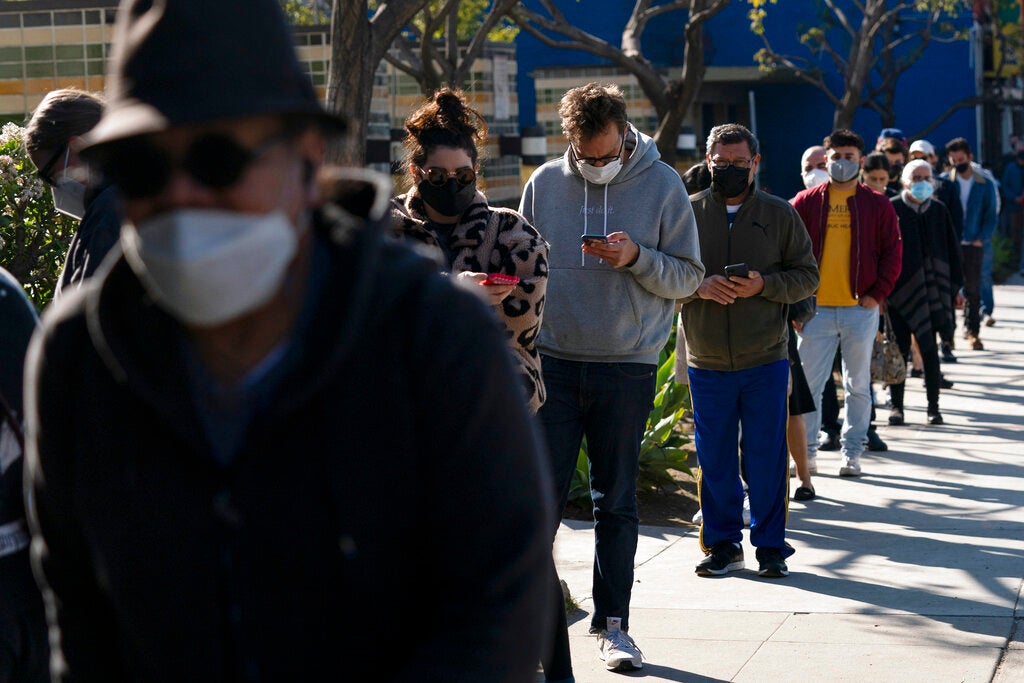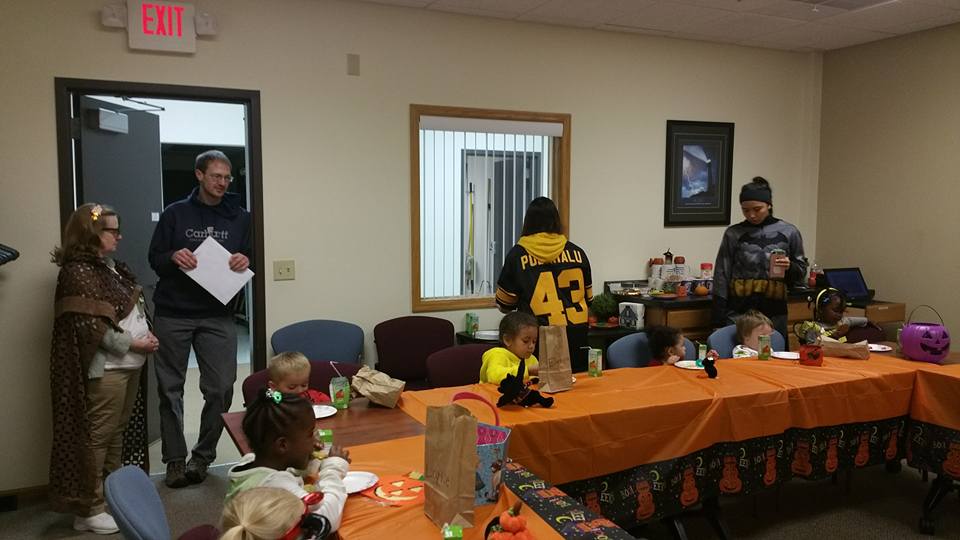This week, the ongoing pandemic appeared to take yet another dark turn as Wisconsin hospitals had more patients with COVID-19 than at any other time during the pandemic.
Given the unprecedented demand for health care services, public officials took additional action this week. Gov. Tony Evers called up the Wisconsin National Guard to assist at hospitals and nursing homes to reduce the mounting pressure.
Wisconsin Public Radio reported that about 50 Guard members have been deployed to six nursing homes in Wisconsin to care for residents and patients waiting to be released from hospitals to long-term care facilities. Additional Guard members will get trained as certified nursing assistants which will allow nursing homes to open up 200 beds by the end of February.
Stay informed on the latest news
Sign up for WPR’s email newsletter.
The Associated Press reported that another 80 soldiers who started training this week will deploy at the end of January and a group of 80 will begin training in early February and deploy by the end of that month.
Evers’ administration said that as of Wednesday, it has helped recruit 626 nurses and other health care workers to support 76 health care facilities in the state.
The staffing crunch as been building as the omicron variant has spread among the population. The Milwaukee Journal Sentinel recently reported that about 600 patients in “Wisconsin hospitals who belonged in nursing homes or assisted living facilities could not be discharged because there weren’t enough staff in the long-term care centers to care for them despite having plenty of beds.”
In the western part of the state, public and health care officials were wondering when they will seek the peak in the number of cases.
Wisconsin DHS: COVID-19 Weekly Recap
The seven-day average for new COVID-19 cases in Wisconsin is 10,985 as of Friday. The Wisconsin Department of Health Services has confirmed 10,486 total deaths from the disease.
Nearly 59 percent of Wisconsinites are fully vaccinated — 82 percent of people age 65 and older, 53.5 percent of children age 12 to 17 and 17.6 percent of children 5 to 11 years old.
[[{“fid”:”1332336″,”view_mode”:”full_width”,”fields”:{“format”:”full_width”,”alignment”:””,”field_image_caption[und][0][value]”:”%3Cp%3ELambeau%20Field%20in%20Aug.%202020.%26nbsp%3B%3Cem%3EAngela%20Major%2FWPR%3C%2Fem%3E%3C%2Fp%3E%0A”,”field_image_caption[und][0][format]”:”full_html”,”field_file_image_alt_text[und][0][value]”:”Clouds and a blue sky can be seen behind Lambeau Field”,”field_file_image_title_text[und][0][value]”:”Lambeau Field”},”type”:”media”,”field_deltas”:{“1”:{“format”:”full_width”,”alignment”:””,”field_image_caption[und][0][value]”:”%3Cp%3ELambeau%20Field%20in%20Aug.%202020.%26nbsp%3B%3Cem%3EAngela%20Major%2FWPR%3C%2Fem%3E%3C%2Fp%3E%0A”,”field_image_caption[und][0][format]”:”full_html”,”field_file_image_alt_text[und][0][value]”:”Clouds and a blue sky can be seen behind Lambeau Field”,”field_file_image_title_text[und][0][value]”:”Lambeau Field”}},”link_text”:false,”attributes”:{“alt”:”Clouds and a blue sky can be seen behind Lambeau Field”,”title”:”Lambeau Field”,”class”:”media-element file-full-width”,”data-delta”:”1″}}]]
Packers push back against proposal to dismantle Lambeau Field Stadium District
The Green Bay Packers are resisting a proposal by a state lawmaker to eliminate the Green Bay/Brown County Professional Football Stadium District and its governing board that oversees Lambeau Field, according to the Green Bay Press Gazette.
State Rep. David Steffen, R-Howard, outlined the idea to the city of Green Bay’s Finance Committee. Steffen’s plan would dismantle the district and its board of seven members. The board co-owns Lambeau Field with the Packers and the city. The legislation would “transfer assets and liabilities of the district to the city of Green Bay, except for $81 million set aside for operations and maintenance of the stadium through at least 2031.
The district was created ahead of Lambeau Field’s 2003 renovations, and Steffen said he believes it has satisfied all of its duties and should be concluded. He has also proposed to re-distribute the $81 million from the maintenance fund, which was largely built up by a half-cent sales tax that ended seven years ago. He said he would give money to Brown County homeowners and additional funds to Brown County, Green Bay, Ashwaubenon, the Greater Green Bay Chamber of Commerce and the Greater Green Bay Community Foundation, the paper reported.
However, Packers officials said the plan would “bust the lease between the Packers, the city and the board.”
“Rep. Steffen’s legislation would position them instead as adversaries, as they would be forced to sort out who would be responsible to make up the operations and maintenance funding deficit. The proposed legislation is unwise public policy for that reason alone,” said Aaron Popkey, Packers public affairs director. “It would constitute a breach of trust and illegal evisceration of the Lambeau Field lease. It would leave no choice other than immediate major litigation to prevent it from taking effect.”
Steffen told the committee “there is no chance the proposal could become law this year,” but he plans to reintroduce the measure next January.
Broadband access plays a huge role in home sales
No matter where you live, broadband is a high priority for people. There is working from home or going to school online. And people want to stay connected with family and friends who don’t live nearby by video chatting on Zoom or FaceTime.
As the Milwaukee Journal Sentinel reports, a high-speed connection can add 10 percent or more to the price of a home. What’s more: many buyers won’t consider a property that doesn’t have high-speed internet.
“We actually did some polling to find out how important this was. We were somewhat surprised by the results, especially from prospective home buyers and renters who said broadband was their number one priority in deciding where they were going to live,” Tom Larson, a senior vice president with the Wisconsin Realtors Association, told the Journal Sentinel.
But there are Wisconsinites who struggle significantly to access broadband, something many of us take for granted.
As the Journal Sentinel reported:
A significant portion of rural Wisconsin — if it has internet access at all — lacks broadband speeds of at least 25 megabit per second downloads and 3 Mbps uploads. For them, ordinary tasks such as posting a video on a website are all but impossible.
“It’s still a huge issue in my area,” state Rep. Tony Kurtz, a Republican from Wonewoc in Juneau County, told the newspaper. “If you talk to the realtors, they’re going to tell you that home values are tied to internet speeds.”
Like many states, there is not a requirement in Wisconsin that broadband service must be disclosed in real estate purchase agreements. Some homebuyers have been stung after buying a home only to find out they don’t have access to reliable internet, like psychologist Arieahn Matamonasa, who works out of her home office on a 12-acre property in the Town of Paris, near Kenosha.
The state has received hundreds of millions of dollars for broadband expansion projects and more funding is on the way. Plus, large internet providers are responding to competition from smaller companies expanding in their territories, the Journal Sentinel reports.
“Certainly in 2023 and 2024, I think we’ll see hundreds of thousands of more people getting new and better internet,” state Broadband Office Director Alyssa Kenney told the Journal Sentinel.
[[{“fid”:”694096″,”view_mode”:”full_width”,”fields”:{“format”:”full_width”,”alignment”:””,”field_image_caption[und][0][value]”:”%3Cp%3E%3Cem%3E%3Ca%20href%3D%22https%3A%2F%2Fwww.flickr.com%2Fphotos%2Fthomashawk%2F%22%3EThomas%20Hawk%3C%2Fa%3E%26nbsp%3B(CC-BY-NC)%3C%2Fem%3E%3C%2Fp%3E%0A”,”field_image_caption[und][0][format]”:”filtered_html”,”field_file_image_alt_text[und][0][value]”:”Prison cells”,”field_file_image_title_text[und][0][value]”:false},”type”:”media”,”field_deltas”:{“2”:{“format”:”full_width”,”alignment”:””,”field_image_caption[und][0][value]”:”%3Cp%3E%3Cem%3E%3Ca%20href%3D%22https%3A%2F%2Fwww.flickr.com%2Fphotos%2Fthomashawk%2F%22%3EThomas%20Hawk%3C%2Fa%3E%26nbsp%3B(CC-BY-NC)%3C%2Fem%3E%3C%2Fp%3E%0A”,”field_image_caption[und][0][format]”:”filtered_html”,”field_file_image_alt_text[und][0][value]”:”Prison cells”,”field_file_image_title_text[und][0][value]”:false}},”link_text”:false,”attributes”:{“alt”:”Prison cells”,”class”:”media-element file-full-width”,”data-delta”:”2″}}]]
All Dane County jail inmates to be tested for COVID-19
The Wisconsin National Guard has been summoned to help test nearly 600 inmates at the Dane County Jail for COVID-19 on Monday.
Sheriff Kalvin Barrett said there are record high coronavirus cases at the jail where nearly 90 inmates of the 594 incarcerated have tested positive, according to the Associated Press.
Barrett said the jail population usually decreased in the wintertime, but not this year when an abnormally high number of inmates is putting further stress on the facility. The sheriff says they are running out of space.
The National Guard had previously tested the jail’s population at the onset of the pandemic.
Milwaukee city officials begin educational campaign to ward against electrical fires
Milwaukee officials announced this week several steps they’re taking to educate the public about the dangers of electrical fires. The details of the plans emerged during the city’s zoning and neighborhood development committee hearing on Tuesday, the Milwaukee Journal Sentinel reported.
The city Department of Neighborhood Services and the Milwaukee Fire Department will host in-person and recorded “informational sessions on electrical systems, detailing things that renters can look for when seeking or leasing an apartment.” The campaign begins later this month.
The newspaper attributed this educational effort to an investigation last summer that “found suspected electrical fires ravage single and two-family rental properties at five times the rate of the rest of the city.” It also reported that the blazes disproportionately affected Black renters. It also said that government assistance — on all levels — doesn’t help in these situations, and this allows some landlords to continue renting properties that have safety concerns.
A member of Acting Mayor Cavalier Johnson’s staff said the hearing that the major is focused on raising the public’s awareness.
“We wanted to bring these departments together to help get out into our neighborhoods to make tenants more aware of what their rights are around electrical hazards, things for them to look out for and how they might be most safe,” said Kailyn Kenney, policy director for the mayor’s office.
Man who bought gun for Kyle Rittenhouse pleads no contest
The man who bought an AR-15-style rifle for Kyle Rittenhouse has pleaded no contest to a reduced charge of contributing to the delinquency of a minor in a deal with prosecutors to avoid prison.
A Wisconsin judge accepted Dominick Black’s plea Monday. Prosecutors dropped two felony counts of intent to deliver a dangerous weapon to a minor. Contributing to the delinquency of a minor is a non-criminal citation.
Black was 18 when he purchased the rifle in May 2020. Rittenhouse was 17 and too young to buy a firearm. Three months later, Rittenhouse used the rifle to shoot three people at a Kenosha protest. He killed two of them — Joseph Rosenbaum, 36, and Anthony Huber, 26. A jury acquitted Rittenhouse of multiple charges in November.
The protests were in response to the shooting of Jacob Blake, a Black man shot by Kenosha police on Aug. 23, 2020, two days before Rittenhouse came to Kenosha.
New Mexico schools are targets of ransomware attacks
The superintendent of Albuquerque Public Schools announced earlier this week that the district was the target of cyberattack, which led to the cancellation of classes for around 75,000 students.
Five school districts in the state have suffered major cyberattacks in the past two years, including one district that’s still wrestling with a cyberattack that hit just after Christmas, NPR reported.
In his note, the superintendent wrote that the district’s technology department had been fending off attacks “for the last few weeks.”
Editor’s note: The Associated Press contributed to this report.
Wisconsin Public Radio, © Copyright 2025, Board of Regents of the University of Wisconsin System and Wisconsin Educational Communications Board.

